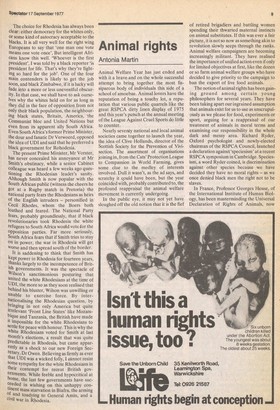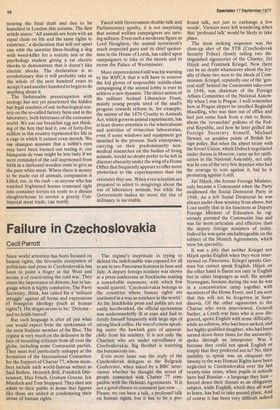Animal rights
Antonia Martin
Animal Welfare Year has just ended and with it a brave and on the whole successful attempt to bring together the most fissiparous body of individuals this side of a school of amoebae. Animal lovers have the reputation of being a touchy lot, a reputation that various public quarrels like the great RSPCA dirty linen display of 1975 and this year's putsch at the annual meeting of the League Against Cruel Sports do little to counter.
Nearly seventy national and local animal societies came together to launch the year, the idea of Clive Hollands, director of the Scottish Society for the Prevention of Vivisection. The assortment of organisations joining in, from the Cats' Protection League to Compassion in World Farming, gives some clue to the medley of interests involved. Dull it wasn't, as the ad says, and scratchy it could have been, but the year coincided with, probably contributed to, the profound reappraisal the animal welfare Movement is currently undergoing.
In the public eye, it may not yet have sloughed off the old notion that it is the fief of retired brigadiers and battling women spending their thwarted maternal instincts on animal substitutes. If this was ever a fair picturc, it is not so now as something akin to revolution slowly seeps through the ranks. Animal welfare campaigners are becoming increasingly militant. They have realised the importance of unified action even if only for limited objectives at first, like the dozen or so farm animal welfare groups who have decided to give priority to the campaign to ban the export of live food animals.
The notion of animal rights has been gaining ground among certain young philosophers for several years. They have been taking apart our ingrained assumption that animals exist for us to use as unscrupulously as we please for food, experiments or sport, arguing for a reappraisal of our treatment of animals in moral terms and examining our responsibility in the whole dark and messy area. Richard Ryder, Oxford psychologist and newly-elected chairman of the RSPCA Council, launched a declaration against `speciesism' at a recent RSPCA symposium in Cambridge. Speciesism', a word Ryder coined, is discrimination against other species because we have decided they have no moral rights — as we once denied black men the right not to be slaves.
In France, Professor Georges Heuse, of the International Institute of Human Biology, has been masterminding the Universal Declaration of Rights of Animals, now nearing the final draft and due to be launched in London this autumn. The first article states: 'All animals are born with an equal claim on life and the same rights to existence,' a declaration that will not upset one whit the scientist force-feeding a dog with weed-killer for a toxicity test or the psychology student giving a rat electric shocks to demonstrate that it doesn't like electric shocks. The declaration is so revolutionary that it will probably take us the whole of the next hundred years to accept it and another hundred to begin to do anything about it.
The fashionable preoccupation with ecology has not yet penetrated the hidden but legal cruelties of our technological society on the so-called factory farm and in the laboratory, both buttresses of the consumer world. We eat our breakfast egg not thinking of the hen that laid it, one of forty-five million in this country inprisoned for life in a cage in which it cannot even stretch. We use shampoo unaware that a rabbit's eyes may have been burned out testing it: our blanquene de veau might be less tasty if we were reminded of the calf imprisoned from birth in a darkened wooden crate to give us the pure white meat. Where there is money to be made out of animals, compassion is killed, too, in the rush — as anyone who has watched frightened horses crammed tight into container lorries en route to a distant slaughterhouse to service a greedy Continental meat trade, can testify. Faced with Government double-talk and Parliamentary apathy, it is not surprising that animal welfare campaigners are turning militant. Even such a moderate figure as Lord Houghton, the animal movement's much respected guru and its chief spokesman in the House of Lords, has called upon campaigners to take to the streets and to storm the Palace of Westminster.
More unprecedented still was his warning to the RSPCA that it will have to remove the kid gloves of responsible middle-class campaigning if the animal lobby is ever to achieve a new dynamic. The direct action of the militant Animal Liberation Front, mainly young people tired of the snail's progress towards reform in, for example, the matter of the 1876 Cruelty to Animals Act, which governs animal experiments, has at least drawn attention to the whereabouts and activities of vivisection laboratories, even if some windows and equipment got smashed in the process. Such enterprises, carrying on their predominantly nonmedical researches on the bodies of living animals, would no doubt prefer to be left in discreet obscurity under the wing of a Home Office that frequently appears to offer more protection to the experimenters than the creatures they use. When even scientists are prepared to admit to misgivings about the use of laboratory animals, but while the Government makes no move the rise of militancy is inevitable.































 Previous page
Previous page